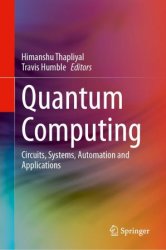Quantum Computing: Circuits, Systems, Automation and Applications
- Добавил: literator
- Дата: 25-11-2023, 08:05
- Комментариев: 0
 Название: Quantum Computing: Circuits, Systems, Automation and Applications
Название: Quantum Computing: Circuits, Systems, Automation and ApplicationsАвтор: Himanshu Thapliyal, Travis Humble
Издательство: Springer
Год: 2024
Страниц: 183
Язык: английский
Формат: pdf (true), epub
Размер: 19.6 MB
This book provides readers with the current state-of-the-art research and technology on quantum computing. The authors provide design paradigms of quantum computing. Topics covered include multi-programming mechanisms on near-term quantum computing, Lagrange interpolation approach for the general parameter-shift rule, architecture-aware decomposition of quantum circuits, software for massively parallel quantum computing, Machine Learning in quantum annealing processors, quantum annealing for real-world machine learning applications, queuing theory models for (Fault-Tolerant) quantum circuits, machine learning for quantum circuit reliability assessment, and side-channel leakage in Suzuki stack circuits.
Quantum computing is an elegant fusion between computer science and principles of quantum physics to facilitate calculations. It promises an excellent computational capacity that is intractable for classical computers to solve challenging problems, including materials science, information science, computer science, mathematical science, and others. However, it turns out that fault-tolerant quantum computers are challenging to realize due to: (i) the difficulty of accessing complete information from entangled systems because of the state collapse upon measurements, and (ii) the difficulty of building, controlling, and measuring quantum states with arbitrarily high accuracy. In this regard, despite the tremendous rate of development, the current state-of-the-art quantum computers mainly contain a small number of quantum bits (qubits) with a noise level called the noisy intermediate-scale quantum devices (NISQ) that prevents them from being practical. Variational quantum algorithms (VQAs) are promising to speed up the computing capacity in the NISQ computers. Massive applications of the VQAs were extensively reported, from dynamic simulation to condensed matter physics, machine learning, mathematical applications, and new frontiers quantum foundations.
In order to realise the potential of hybrid algorithms and room-temperature quantum accelerators for quantum utility, one needs an appropriately parallelised quantum programming framework, specifically optimised for hybrid applications. The Quantum Brilliance Software Development Kit (SDK) is a full-stack software framework geared towards massive parallelism for accelerator-based hybrid quantum-classical workflows. The QB SDK is designed for ease of integration into a range of performance-critical environments: HPC, cloud, GPU workstations and even embedded/edge systems. The SDK’s high-performance core and bundled simulators are implemented in C++. It provides hybrid and pure-quantum programming interfaces in both C++ and Python, with an extensive language binding module for Python included. This allows users to access most of the underlying C++ features from Python, whilst simultaneously having access to Python’s rich array of tools, such as NumPy for numerical programming and Matplotlib for plotting.
Contents:
Скачать Quantum Computing: Circuits, Systems, Automation and Applications
Внимание
Уважаемый посетитель, Вы зашли на сайт как незарегистрированный пользователь.
Мы рекомендуем Вам зарегистрироваться либо войти на сайт под своим именем.
Уважаемый посетитель, Вы зашли на сайт как незарегистрированный пользователь.
Мы рекомендуем Вам зарегистрироваться либо войти на сайт под своим именем.
Информация
Посетители, находящиеся в группе Гости, не могут оставлять комментарии к данной публикации.
Посетители, находящиеся в группе Гости, не могут оставлять комментарии к данной публикации.

